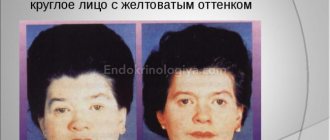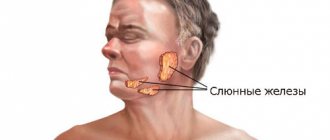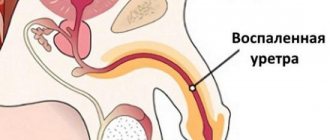Autoimmune thyroiditis is an inflammatory disease of the thyroid gland caused by an attack of specific proteins on the functional cells of the body's own. The pathology is genetic in nature. Autoimmune thyroiditis is an inflammatory disease of the thyroid gland caused by an attack of specific proteins on the functional cells of the body's own. The pathology is genetic in nature. Symptoms of autoimmune thyroiditis increase as the function of the gland is suppressed, but the first signs of pathology are often confused with manifestations of other somatic diseases. I begin drug therapy when the patient’s hormonal status changes. Autoimmune thyroiditis is a chronic disease.
general description
Autoimmune thyroiditis is a chronic inflammation of the thyroid gland of autoimmune origin, which can lead to its destruction and the development of primary hypothyroidism.
The most common thyroid disease. The prevalence of autoimmune thyroiditis among children ranges from 0.1 to 1.2%, among women over 60 years of age - from 6 to 10%. In the general population, for every 10-30 adult women there is 1 case of autoimmune thyroiditis.
Autoimmune thyroiditis is asymptomatic for a long time. The patient may be bothered by moderate weakness, fatigue, a feeling of pressure, coma in the thyroid gland, and joint pain. In most cases, at the onset of the disease, the function of the thyroid gland increases and an excessive amount of thyroid hormones is produced - hyperthyroidism.
Diet
Required Products
The diet should contain proteins, antioxidants, selenium and vitamins:
- meat and fish;
- bread;
- vegetables;
- cereals;
- milk;
- eggs.
Prohibited Products
Irritating products contribute to the development of the disease:
- seasonings;
- spicy and spicy delicacies;
- smoked meats;
- pickles;
- alcohol.
Symptoms of autoimmune thyroiditis
The main symptoms of hyperthyroidism:
- lacrimation, increased sensitivity to light, double vision, exophthalmos (bulging eyes);
- weight loss, despite eating enough food and good appetite;
- increased excitability, tearfulness, fatigue;
- tachycardia, a feeling of interruptions in the work of the heart;
- increased blood pressure (systolic);
- small-scale tremor, muscle weakness;
- diarrhea;
- sweating, heat intolerance.
Over time, the function of the thyroid gland decreases and hypothyroidism develops.
The main symptoms of hypothyroidism:
- slow speech, thinking, memory loss;
- puffiness and swelling;
- fragility and hair loss;
- decreased appetite, tendency to constipation;
- moderate weight gain;
- constant feeling of cold;
- difficulty in nasal breathing, hearing loss;
- decreased blood pressure, bradycardia;
- in women - menstrual irregularities;
- weakness, fatigue, drowsiness.
Complications
Autoimmune thyroiditis can lead to irreversible damage to the thyroid gland, as the gland begins to enlarge to produce more hormones, which leads to the development of a goiter.
There are different types of goiter:
- Diffuse, characterized by one smooth swelling;
- Nodular, characterized by a lump;
- Multinodular, characterized by a large number of lumps;
- Retrosternal.
Sometimes small goiters do not need treatment; larger ones often require radioactive iodine to reduce their size. A substernal goiter sometimes requires surgical removal, especially if it interferes with breathing or swallowing.
Progressive metabolic disorders and growing hormonal imbalance can affect other organs, which will lead to a cascade of complications in the future.
Infertility
Low thyroid hormone levels can affect the hormonal mechanism that regulates the menstrual cycle and ovulation. This can lead to infertility. According to a study published in the International Journal of Endocrinology, this diagnosis may affect up to 50 percent of women with autoimmune thyroiditis. Even with successful treatment of hypothyroidism, there is no guarantee that fertility will be fully restored.
Heart diseases
Even mild hypothyroidism can have a profound impact on your heart health. Thyroid hormone imbalance causes high levels of “bad” LDL (low-density lipoprotein) cholesterol, which leads to hardening of the arteries (atherosclerosis) and increases the risk of heart attacks and stroke.
By the way, we recommend reading the article Should you worry when you notice symptoms of postpartum thyroiditis?
Pericarditis, a buildup of fluid around the heart, can affect 30 to 80 percent of people with hypothyroidism.
Severe hypothyroidism can lead to pericardial tamponade, a condition that makes it harder for the heart to pump blood. In some cases, this can lead to a decrease in blood pressure and death.
Complications of pregnancy
Because the mother's thyroid hormone is vital for the development of the fetus, untreated hypothyroidism during pregnancy can lead to potentially serious complications for both mother and baby.
According to research, hypothyroidism nearly doubles the risk of preterm birth and significantly increases the risk of low birth weight, premature rupture of the placenta, abnormal heart rhythms and fetal respiratory failure.
Even with subclinical hypothyroidism (in which there are no typical symptoms), pregnant women are at greater risk of gestational diabetes, postpartum hemorrhage, and postpartum depression than women without thyroid disease.
Hashimoto's encephalopathy
Hashimoto's encephalopathy is a rare complication in which swelling of the brain can cause severe neurological symptoms. This disease affects only 2 in 100,000 people per year and usually occurs between the ages of 41 and 44. Women get sick four times more often than men.
The disease usually manifests itself in one of two ways:
- Persistent decline in cognitive function, leading to tremors, drowsiness, brain fog, hallucinations, dementia, and in rare cases, coma;
- Seizures or sudden attacks similar to a stroke.
Hashimoto's encephalopathy is usually treated with intravenous corticosteroid medications, such as prednisone, to quickly reduce brain swelling.
Myxedema
Myxedema is a severe form of hypothyroidism in which the metabolism slows to the point that a person may fall into a coma. It is associated with an untreated condition and can be recognized by characteristic changes in the skin and other organs. The following symptoms may occur:
- Swollen skin;
- drooping eyelids;
- Severe intolerance to cold;
- Drop in body temperature;
- Slow breathing;
- Extreme exhaustion;
- Slow motion;
- Psychosis.
Myxoedema requires emergency medical attention.
Cancer
Autoimmune thyroiditis puts you at increased risk of not only thyroid cancer, but also throat cancer. In fact, disease-induced dysregulation of hormonal activity leads to a 1.68-fold increase in the risk of all types of cancer, according to a study from Taiwan that included 1,521 people with the diagnosis and 6,084 people without it.
Cancer tends to develop in people with autoimmune thyroiditis between the ages of 35 and 55. Research shows that the disease is associated with at least a 4.76-fold increase in the risk of throat cancer and an 11.8-fold increase in the risk of thyroid cancer.
That is why, if AIT is diagnosed, it is worth strengthening measures to prevent thyroid cancer. Namely, make changes to your diet, follow a diet. And in case of high risk, the gland should be removed prematurely before irreversible consequences occur.
By the way, we recommend reading the article Causes and symptoms of chronic thyroiditis
Treatment of autoimmune thyroiditis
Treatment depends on the stage of the disease.
At the stage of thyrotoxicosis, drugs that reduce the synthesis of thyroid hormones (thyreostatics) are usually not used. Symptomatic therapy is carried out aimed at relieving the manifestations of hyperthyroidism (palpitations, increased blood pressure).
At the stage of hypothyroidism, drugs containing thyroid hormones are used for treatment: Levothyroxine (L-thyroxine, Euthyrox). The dose of the drug is selected individually for each patient under the control of pulse, blood pressure, level of thyroid-stimulating and thyroid hormones.
Causes
Medicine does not have information about the prerequisites for the occurrence of autoimmune diseases. Among the probable causes are the following factors:
- past infectious diseases - when fighting pathogens, the immune system may fail;
- heredity;
- serious stress loads;
- exposure to adverse factors, in particular radiation;
- treatment with certain drugs;
- excess, deficiency of iodine;
- diseases of the respiratory system and pharynx.
Incidence (per 100,000 people)
| Men | Women | |||||||||||||
| Age, years | 0-1 | 1-3 | 3-14 | 14-25 | 25-40 | 40-60 | 60 + | 0-1 | 1-3 | 3-14 | 14-25 | 25-40 | 40-60 | 60 + |
| Number of sick people | 0.2 | 1 | 4 | 10 | 10 | 12 | 7 | 0.1 | 2 | 6 | 13 | 13 | 10 | 11 |
Stages of the disease
During chronic autoimmune thyroiditis, there are 3 successive phases:
- Euthyroid phase. There are no dysfunctions of the thyroid gland, the duration is several years.
- The phase of subclinical hypothyroidism is the progressive destruction of gland cells, compensated by tension in its functions. There are no clinical manifestations, the duration is individual (possibly lifelong).
- The phase of obvious hypothyroidism is a clinically pronounced decrease in gland function.
In postpartum, silent and cytokine-induced thyroiditis, the phases of the autoimmune process are somewhat different:
I. Thyrotoxic phase - a massive release of thyroid hormones into the systemic circulation from cells destroyed during an autoimmune attack.
Thyrotoxic phase of autoimmune thyroiditis - thyrotoxicosis
II. The hypothyroid phase is a decrease in the level of thyroid hormones in the blood against the background of massive immune damage to gland cells (usually lasts no more than a year, in rare cases - lifelong).
Hypothyroid phase of autoimmune thyroiditis - hypothyroidism
III. The phase of restoration of thyroid function.
A monophasic process is rarely observed, the course of which is characterized by stuckness in one of the phases: toxic or hypothyroid.
Due to the acute onset caused by massive destruction of thyrocytes, postpartum, silent and cytokine-induced forms are combined into the group of so-called destructive autoimmune thyroiditis.
Postpartum thyroiditis can degenerate into chronic autoimmune thyroiditis (with further outcome in overt hypothyroidism) in 20–30% of women.
What to do if you suspect a disease
Immunological studies
Autoimmune thyroiditis is characterized by an increase in the concentration of antibodies to thyroglobulin (AT-TG) and to thyroid peroxidase (AT-TPO).
Blood test for antibodies to thyroglobulin
In chronic Hashimoto's thyroiditis, the concentration of antibodies to thyroglobulin is increased in 97% of patients. In autoimmune thyroiditis, the concentration of antibodies to thyroglobulin is increased.
Blood test for antibodies to thyroid peroxidase
The concentration of antibodies to thyroid peroxidase is higher than normal.
Blood test for markers of osteoporosis
In autoimmune thyroiditis, a decreased level of parathyroid hormone is observed.
Contraindications to folk remedies
Traditional methods of treatment cannot be used for chronic systemic diseases of the excretory, cardiovascular, and digestive systems. Even in the absence of these diseases, it is better to consult a doctor about the admissibility of using various folk recipes. If you have hypothyroidism, you will have to refuse treatment with products and ingredients that inhibit metabolic processes or are too high in calories.
None of the home remedies for hypothyroidism are hypoallergenic. Signs of individual sensitivity (allergic reaction) to the medicine: runny nose, feeling of a lump in the throat, shortness of breath, diarrhea, increased gas formation. If these symptoms occur, you should immediately consult a doctor to relieve your allergy. In the future, the use of traditional treatment according to this recipe will have to be abandoned.
Symptoms
| Occurrence (how often a symptom occurs in a given disease) | |
| Fatigue during physical activity (fatigue, loss of strength) | 30% |
| Eyebrow loss (loss of eyebrows) | 25% |
| Burning, dry mouth | 25% |
| Dryness of the entire skin (dry skin) | 25% |
| Slowing down speech | 20% |
| Deepening of the voice | 20% |
| Discomfort in the thyroid area | 10% |
| Decreased blood pressure (low blood pressure, hypotension) | 10% |
Forms of the disease
There are 4 main forms of the disease:
- Chronic autoimmune thyroiditis, or Hashimoto's thyroiditis (disease), or lymphocytic thyroiditis.
- Postpartum thyroiditis.
- Painless thyroiditis, or “silent” (“silent”) thyroiditis.
- Cytokine-induced thyroiditis.
Chronic autoimmune thyroiditis also has several clinical forms:
- hypertrophic, in which the gland is enlarged to varying degrees;
- atrophic, accompanied by a sharp decrease in the volume of the thyroid gland;
- focal (focal);
- latent, characterized by the absence of changes in gland tissue.
Chronic fibrous thyroiditis
Chronic fibrous thyroiditis may not have clinical manifestations for a long time. The earliest symptom of this pathology is usually a feeling of a “lump” in the throat and difficulty swallowing. The advanced stage of the disease is characterized by disturbances in speech, swallowing, breathing, choking while eating, and hoarseness of the voice.
Palpation reveals a pronounced uneven enlargement of the thyroid gland (tuberosity), its inactivity during swallowing, compactness, painlessness, and a dense “woody” structure. Changes in the affected gland are usually diffuse in nature and are associated with a decrease in its functionality and the development of hypothyroidism.
Pressure on adjacent tissues is expressed by compression syndrome, which is manifested by blurred vision, headaches, difficulty swallowing, tinnitus, breathing problems and pulsation of the cervical vessels.
There are also specific thyroiditis, which include inflammatory processes and structural changes in the thyroid tissue of the thyroid gland with its mycotic, tuberculous and syphilitic lesions. Basically, specific thyroiditis is chronic, but if involved, the process of secondary infection can become acute.
Diagnostic methods
Diagnosis of any pathological condition of the thyroid gland includes:
- Complete blood count - shows the level of leukocytes, which increases with thyroid disease. A deviation of the erythrocyte sedimentation rate (ESR) from the norm may indicate a viral origin of the disease, oncology, or the presence of a purulent focus in the thyroid gland.
- Biochemical blood test - used to detect antibodies to healthy thyroid cells. Helps assess the hormonal background of the body, determine the level of hormones T3 and T4.
- Doppler ultrasound is used to assess the state of blood flow in small vessels in order to identify tumors.
- Scintigraphy is prescribed to check the functional state and evaluate the structure of the thyroid gland.
- Puncture biopsy - used for nodular goiter to identify the origin of neoplasms.
Classification of the disease
Types of thyroiditis according to the International Classification of Diseases (ICD10):
- acute (purulent and non-purulent) – is infectious in nature. Thyroiditis occurs with partial damage to the thyroid lobe (focal) or spreads to the entire lobe or organ (diffuse);
- subacute (De Quervain's thyroiditis) - manifests itself in three forms: granulomatous, lymphocytic, pneumocystis; According to the prevalence, the disease is focal and diffuse;
- chronic autoimmune (Hashimoto's disease);
- Riedel's chronic thyroiditis (fibro-invasive).
There are also gestational thyroiditis in women, which occurs during pregnancy or the postpartum period, and pathology caused by taking medications. The disease in these cases does not require treatment and goes away on its own.
Prevention
In order to prevent acute thyroiditis, prevention will consist of following the following rules:
- Generalization of the island inflammatory process, as well as its transition to chronic thyroiditis of the thyroid gland, should be avoided. Therefore, at the first pathological signs, even from other systems, you should contact a specialist and begin treatment.
- Eliminate foci of chronic infection in a timely manner and prevent the development of exacerbations.
- Take measures aimed at strengthening the immune system.
- Avoid traumatic effects on the neck and thyroid gland, which can occur completely by accident.
- Insolation should be carried out during periods of least solar activity, and visits to the solarium should be limited.
- Women of reproductive age should regularly visit a gynecologist to prevent the development of dishormonal pathologies.
For chronic and autoimmune thyroiditis, preventive measures are aimed at preventing possible causes. As a rule, there are no specific measures in this case. These include:
- People with an existing hereditary predisposition should regularly visit an endocrinologist and undergo laboratory and instrumental diagnostics.
- If initial changes are identified, it is necessary to begin drug treatment as early as possible; this will help to significantly compensate for the condition.
- Prevent exposure to radiation, hypothermia, and traumatic effects.










